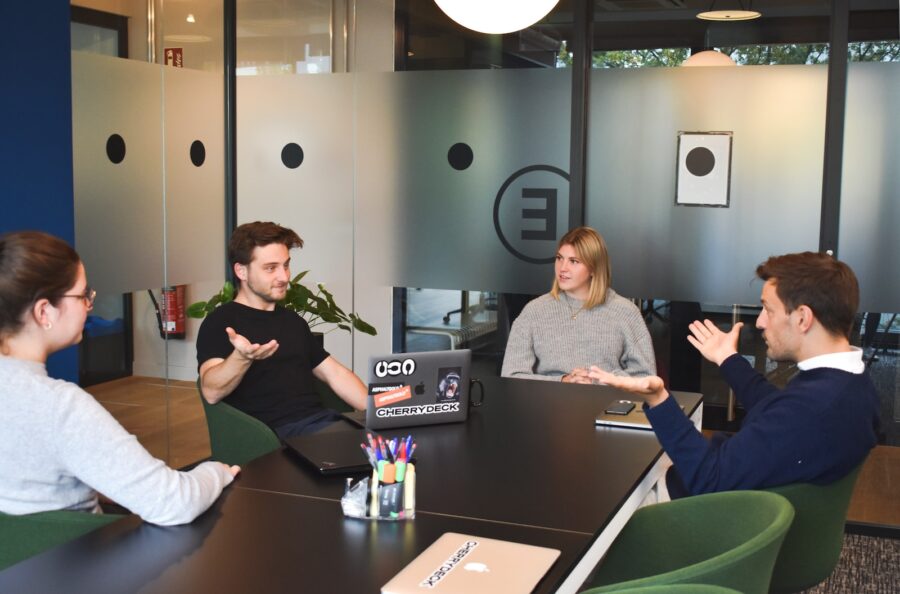Feeling able to ask searching questions and challenge a system that’s actively trading on the goodwill of staff and driving poor wellbeing requires a climate of psychological safety. Just feeling able to speak up with confidence about what’s bothering you, or feeling fearless to try something new because you’re confident your leaders and peers would view a failure as a learning opportunity rather than an opportunity to apportion blame, requires the same amount of inner strength. Even if workplace conditions are ‘right’ for authenticity, the person with something important to share still needs to feel brave enough to actually share it. Strength of character is needed.
Human beings are complex creatures with unique and interconnected hang-ups, worries, judgements, strong emotions and related reactionary behaviours. Because of this, when people feel devalued, they often react defensively, withdraw or take things personally rather than looking objectively at the situation. Building self-awareness and using it to develop personal strength of character gives everyone in the organisation, regardless of their position in the hierarchy, the opportunity to keep sufficiently clear-headed to speak up and contribute directly to the organisation’s development.
The more people there are who feel empowered and emboldened to share their unique insights, the faster the prison door of fear gets unlocked for others – a portal that, when bolted shut, consigns everyone else to operating within creative constraints. Under these circumstances, the team may unconsciously feel that there will be a risk involved in stepping outside the door. Better then to stay well inside rather than risk career-limiting consequences. Not raising your head above the parapet, complying unreservedly with unpopular decisions and working diligently within these unspoken guardrails in order to be seen as a solid team player is an obvious and popular strategy.
Unsurprisingly, leaders with controlling or didactic tendencies are extremely comfortable with their employees taking this approach. However, a lack of articulated pushback shouldn’t be taken as evidence that there is none. People’s knowledge that something is wrong or feelings that the objective could be achieved in a less damaging way are very much there; they’re just toxically suppressed.
In work environments that are generally psychologically unsafe, any brave bursts of openness that do occur are often received with pushback, headshaking ‘disappointment’ or even stealthy exclusion from future explorations of the topic. Little wonder then that the ‘keep your head down and say nothing’ strategy is the one most often pursued by employees, a strategy also often adopted outside the workplace.
A little self-compassion should be applied here. Doing something different is difficult and humans aren’t fond of doing it. Humans have evolved to feel more comfortable with the familiar, even when doing what’s well established doesn’t produce the best outcome on another axis, e.g. our health. People tend to make use of available resources in such a way that they can follow a path of least resistance. This makes use of the resources available yet may not be the most effective way.
It takes a concerted effort to change behaviour, even when doing so would produce benefits and it’s the right thing to do. Doing this on your own, departing from what everyone else is doing, is even more difficult. It’s therefore easy to see how staff might readily give up on healthy high performance behaviours such as going home on time, taking strategic recovery breaks or using fitness facilities in the middle of the morning if this results in sideways looks, snide comments or unconcealed glances at a watch.
For the same reasons, the difficulty in ‘being the change’ can also extend to feeling confident about openly admitting missteps and mistakes. With most workplace cultures still unintentionally positioning failure as negative or a manifestation of weakness or lack of competency rather than a valuable learning opportunity, mistakes aren’t easy to talk about. It’s fair to assume that owning up to one may be accompanied by a penalty of some sort.
Not surprisingly, therefore, sophisticated blame cultures can develop under these conditions, leading to furtive behaviour, cover-ups, abdication of responsibility, lack of accountability and denial. Unless the unfortunate employee has sufficient resilience and emotional intelligence to handle the comeback, the most likely response to discovering an error has been made will be to keep quiet about it. At best this leads to defensiveness; at worst it can be relationship wrecking or career destroying.
Because people don’t generally live and work in a psychologically safe world, being open, honest and candid at work can be a challenge. Developing a psychologically safe environment where people can speak up, admit their mistakes, put forward novel ideas or positively challenge each other requires energy and resilience from multiple stakeholders, simultaneously. How comfortable people feel about being open is obviously going to vary a good deal, influenced by differences in personality, working environment and circumstances. This same variability will guarantee that the consequences of speaking up will not always be positive. A prophet is rarely welcome in their own country, after all.
This is why being robust, resilient and authentic is so important. You need to be able to absorb the knocks you encounter in response to brave openness. Importantly it will require you to tap into your inner resources and build your strength of character so that you can act in accordance with your deeply held core values and demonstrate your level of integrity – both to yourself and others.
Vicky Smith
Vicky Smith is passionate about sharing her knowledge and has more than 20 years of consulting, coaching, facilitation, and training experience in locations across the globe. She holds an MSc in Organisation Development and Consultancy, an MSc in Psychology and an MSc in Applied Health and Exercise. She is also the co-author of Brave New Leader: How to Transform Workplace Pressure into Sustainable Performance and Growth.



